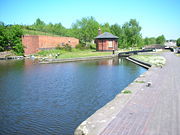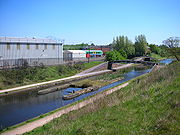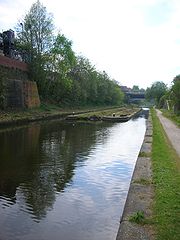
Toll point
Encyclopedia


United Kingdom
The United Kingdom of Great Britain and Northern IrelandIn the United Kingdom and Dependencies, other languages have been officially recognised as legitimate autochthonous languages under the European Charter for Regional or Minority Languages...
a toll point or toll island is a place on a canal where a fee was collected as boats carrying cargo passed. These were sited at strategic points such as the stop lock at the transition from one canal company to another where water transfer was a concern, or at busy locks where water usage and pumping costs were an issue.
Generally this was at a lock or an artificially constricted part of the canal so that the boat had to pass within inches of the toll point unable to evade the toll. On canals where the fee was based on cargo weight it also put the boat in a convenient place to read the gauging mark height from the water line. On busy canals which were built with a towpath on either side such as the Birmingham Canal Navigations
Birmingham Canal Navigations
Birmingham Canal Navigations is a network of navigable canals connecting Birmingham, Wolverhampton, and the eastern part of the Black Country...
BCN New Main Line the toll house may have been built on an island between two constricted channels so that one toll point could collect from boats travelling in each direction. The BCN retains several of these islands, for example at Winson Green Junction.
Waterway toll fee
The maximum tolls were set by the river navigation and canal ActsAct of Parliament
An Act of Parliament is a statute enacted as primary legislation by a national or sub-national parliament. In the Republic of Ireland the term Act of the Oireachtas is used, and in the United States the term Act of Congress is used.In Commonwealth countries, the term is used both in a narrow...
. Some early Acts allowed fees to be set by local commissioners or Quarter Sessions
Quarter Sessions
The Courts of Quarter Sessions or Quarter Sessions were local courts traditionally held at four set times each year in the United Kingdom and other countries in the former British Empire...
, but from 1720 fees could only be reassessed by Parliament
Parliament of the United Kingdom
The Parliament of the United Kingdom of Great Britain and Northern Ireland is the supreme legislative body in the United Kingdom, British Crown dependencies and British overseas territories, located in London...
.
Fees were set in pence per mile, or part. Sometimes empty boats were exempt, or free if returning loaded, or if water was running over the weir
Weir
A weir is a small overflow dam used to alter the flow characteristics of a river or stream. In most cases weirs take the form of a barrier across the river that causes water to pool behind the structure , but allows water to flow over the top...
s. Fees depended on the type of cargo. Coal, stone and lime were the cheapest, then iron ore, then finished goods, with perishables and packets being the most expensive. Tolls might be refunded for long distance trips to encourage expansion of trade - "drawbacks" - particularly applied to the coal trade.
Some exceptions were made to placate local land owners. The delivery of straw, manure or road building materials, as well as coal for the poor (5,000 tons per year on the Derby Canal
Derby Canal
The Derby Canal ran from the Trent and Mersey Canal at Swarkestone to Derby and Little Eaton, and to the Erewash Canal at Sandiacre, Derbyshire, England. The canal gained its Act of Parliament in 1793 and was fully completed in 1796...
), or contribution to county rates
Rates (tax)
Rates are a type of property tax system in the United Kingdom, and in places with systems deriving from the British one, the proceeds of which are used to fund local government...
may have freed the carrier of toll fees.
In the 1790s toll fees were greatly reduced by Parliament to encourage canal use. In practice, competition kept tolls below the maximum, particularly after the arrival of the railways.
Special tolls existed for use of boat lifts, inclined planes and tunnels, but companies were not allowed to charge different tolls for special customers or over different parts of the line until 1845 (the Canal Tolls Act).
Another type of toll was the compensation toll, charged on a new canal joining an existing waterway, perhaps 5d.
British One Penny coin (pre-decimal)
The English Penny, originally a coin of 1.3 to 1.5 g pure silver, includes the penny introduced around the year 785 by King Offa of Mercia. However, his coins were similar in size and weight to the continental deniers of the period, and to the Anglo-Saxon sceats which had gone before it, which were...
on all goods.
Fees were paid by the boatman or by account. Fraud was common: under declaration of the cargo (proved by gauging or by dry weighing of the boat), hiding valuable goods under cheaper cargo, or by bribery.
Tolls lasted until nationalisation in 1948 but are still paid by commercial carriers on commercial waterways. Pleasure boats pay British Waterways
British Waterways
British Waterways is a statutory corporation wholly owned by the government of the United Kingdom, serving as the navigation authority in England, Scotland and Wales for the vast majority of the canals as well as a number of rivers and docks...
an annual licence fee based on the length of the craft.

Gauging point
Canals were set up as commercial enterprises. The fee for using the canals was dependent on the type of cargo and its weight. Each boat had to have four (or, for some canal companies - Swansea, Glamorganshire, Oxford, six) gauging plates fitted to the hull at the "corners" of the boat - bow and stern at each side - indicating a measurement point and a boat serial number.The boat was calibrated by measuring the height of the gunwale
Gunwale
The gunwale is a nautical term describing the top edge of the side of a boat.Wale is the same word as the skin injury, a wheal, which, too, forms a ridge. Originally the gunwale was the "Gun ridge" on a sailing warship. This represented the strengthening wale or structural band added to the design...
s above water level at each corner with the boat unladen and then measured again when known weights had been loaded into the boat from an overhead gantry. These measurements were logged in toll-keeper's tables and copies sent to every toll office within the boat's trading range. At toll offices if a toll collector suspected an incorrect waybill
Waybill
A waybill or consignment note is a document issued by a carrier giving details and instructions relating to the shipment of a consignment of goods. Typically it will show the names of the consignor and consignee, the point of origin of the consignment, its destination, route, and method of...
(declared cargo) the height of the four corners of the boat were checked with a gauging stick and averaged to allow for uneven cargo loading. That boat's entry in the gauging table was used to determine the cargo weight. The toll fee was worked out from the weight and cargo type.
The fitting and calibration of gauging plates was done at a gauging station or indexing station. On the Birmingham Canal Navigations (BCN) Main Line
BCN Main Line
The BCN Main Line, or Birmingham Canal Navigations Main Line describes the evolving route of the Birmingham Canal between Birmingham and Wolverhampton in England....
the Smethwick Gauging Station near the Engine Arm Aqueduct
Engine Arm Aqueduct
The Engine Arm Aqueduct near Smethwick, West Midlands, England, was built in 1825 by Thomas Telford to carry a water feeder, the Engine Arm, from Edgbaston Reservoir over the BCN New Main Line canal to the adjacent and parallel Old Main Line...
was on an island, with a covered gantry in a centre channel where boats were loaded with weights, plated and calibrated. The channels either side allowed two-way traffic and possibly the collection of tolls. The buildings and equipment were demolished in the 1940s. Another BCN indexing station at Tipton
Tipton
Tipton is a town in the Sandwell borough of the West Midlands, England, with a population of around 47,000. Tipton is located about halfway between Birmingham and Wolverhampton. It is a part of the West Midlands conurbation and is a part of the Black Country....
survives. Here iron weights were loaded, four tons at a time. Other canal companies had stations at Etruria
Etruria, Staffordshire
Etruria is a suburb of Stoke-on-Trent, Staffordshire, England.-Home of Wedgwood:Etruria was the fourth and penultimate site for the Wedgwood pottery business. Josiah Wedgwood, who was previously based in Burslem, opened his new works in 1769. It was named after the Italian district of Etruria,...
on the Trent and Mersey Canal
Trent and Mersey Canal
The Trent and Mersey Canal is a in the East Midlands, West Midlands, and North West of England. It is a "narrow canal" for the vast majority of its length, but at the extremities—east of Burton upon Trent and west of Middlewich—it is a wide canal....
and Northwich
Northwich
Northwich is a town and civil parish in the unitary authority of Cheshire West and Chester and the ceremonial county of Cheshire, England. It lies in the heart of the Cheshire Plain, at the confluence of the rivers Weaver and Dane...
on the Weaver
River Weaver
The River Weaver is a river, navigable in its lower reaches, running in a curving route anti-clockwise across west Cheshire, northern England. Improvements to the river to make it navigable were authorised in 1720 and the work, which included eleven locks, was completed in 1732...
.
The gauging plates originally had scales showing the tonnage marked on them but around 1810 the method of using tables was implemented, often supplemented by a visible scale for quick checking. Boats were re-indexed every ten years as their wooden infrastructure became waterlogged and they ran lower in the water.
See also
- Canals of the United KingdomCanals of the United KingdomThe canals of the United Kingdom are a major part of the network of inland waterways in the United Kingdom. They have a colourful history, from use for irrigation and transport, through becoming the focus of the Industrial Revolution, to today's role for recreational boating...
- History of the British canal systemHistory of the British canal systemThe British canal system of water transport played a vital role in the United Kingdom's Industrial Revolution at a time when roads were only just emerging from the medieval mud and long trains of pack horses were the only means of "mass" transit by road of raw materials and finished products The...

